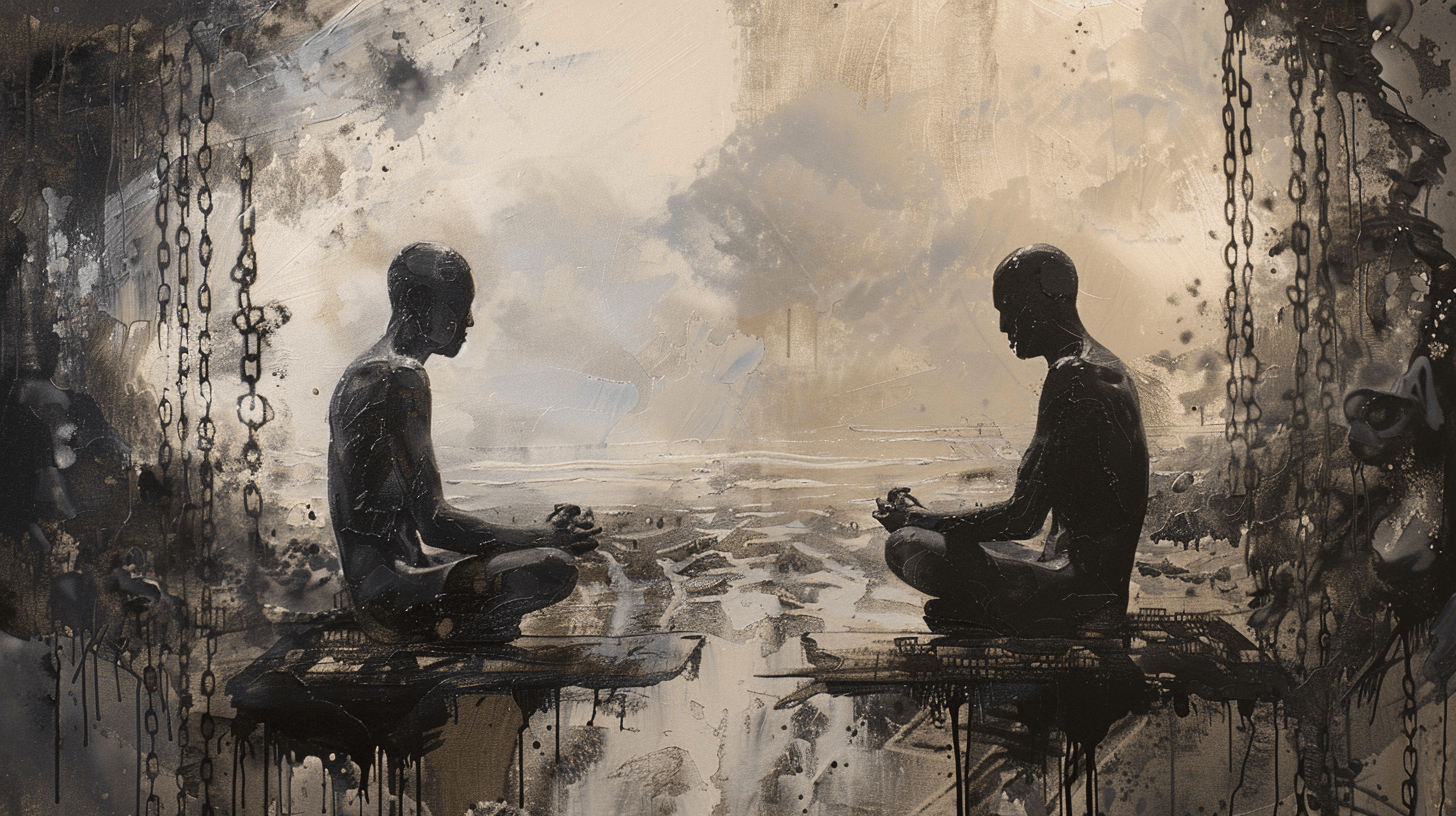Introduction: Understanding the Egoic Mind

The Egoic Mind is a term used in both psychology and spirituality, referring to the mental structure that shapes our sense of self and identity. It’s that internal voice constantly analyzing, comparing, judging, and protecting the image we hold of ourselves. While this mental construct is part of what makes us human, it can also be the source of much of our mental suffering. From incessant worry about the future to replaying past mistakes, the Egoic Mind often keeps us trapped in an endless cycle of overthinking and emotional turbulence.
You might be wondering: Why does this happen? Why do our minds cling to this endless chatter? The answer lies in how the Egoic Mind thrives. It feeds on our attachment to personal identity, comparisons, fears, and societal expectations, creating a mental prison of anxiety and stress. But the good news is, through conscious effort and mindful practices, you can begin to silence this relentless voice and step into a more peaceful, present, and authentic state of being.
Watch Alan Watts Explain the Egoic Mind: The Key to Inner Peace
The Nature of the Egoic Mind: How It Controls Our Thoughts

To begin silencing the Egoic Mind, we first need to understand how it functions. The Egoic Mind isn’t inherently malicious; rather, it’s a survival mechanism evolved over time to help us navigate the world. It creates stories about who we are based on past experiences, societal roles, and external validation, reinforcing a sense of individuality.
Consider this: Have you ever caught yourself comparing your success to others on social media? Or felt defensive when someone questioned your opinion? That’s the Egoic Mind at work, pulling you into narratives that revolve around “me” and “mine.” This constant identification with thoughts and labels fuels insecurities, fears, and a never-ending desire for more—whether it’s more recognition, more possessions, or more approval. The Ego’s desire to maintain control makes it hard for us to let go of these thought patterns, keeping us stuck in a loop of mental clutter.
For example, when you’re having a conversation and suddenly feel the need to “win” an argument or prove a point, it’s often the Egoic Mind reacting to a perceived threat to your self-image. This is where the suffering begins. By constantly trying to defend and uphold an image, the Egoic Mind leads us into stress and emotional turbulence. Recognizing this is the first step toward liberation.
Effects of the Egoic Mind on Mental and Emotional Well-being

When the Egoic Mind is in control, it affects not only our thoughts but also our emotions. Anxiety, depression, frustration, and envy are often the results of an overactive Egoic Mind. Why? Because the ego is never satisfied. It thrives on dissatisfaction, always seeking something better, creating an endless cycle of wanting and striving.
Eckhart Tolle, in his groundbreaking book The Power of Now, explains this concept beautifully. He highlights how the Egoic Mind is constantly focused on the past or future, robbing us of the peace found in the present moment. This constant preoccupation with time—worrying about the future or regretting the past—prevents us from experiencing the simple joys of the now.
Let’s consider an example. Imagine you’re at a family gathering. While everyone is laughing and enjoying the moment, you might be mentally preoccupied with work stress or thinking about something embarrassing that happened months ago. Your Egoic Mind pulls you out of the present, preventing you from fully enjoying the experience. This mental fragmentation leaves you feeling disconnected, anxious, and emotionally drained.
Over time, this kind of thinking can take a toll on mental health. People who consistently operate from an Egoic Mindset may experience chronic stress, dissatisfaction, and even burnout. The constant need for external validation makes inner peace seem elusive, as the ego is conditioned to measure self-worth through external achievements, possessions, and comparisons. By keeping us perpetually unfulfilled, the Egoic Mind traps us in a state of mental and emotional imbalance.
Practices to Silence the Egoic Mind

Each technique helps you cultivate greater awareness and mindfulness, allowing you to observe the ego without being swept away by it. Let’s begin with the foundational practice of mindfulness meditation.
Mindfulness Meditation: Observing Without Attachment
Mindfulness meditation is one of the most powerful tools to silence the Egoic Mind. The essence of mindfulness is the ability to observe your thoughts without attaching to them. Instead of getting caught up in the ego’s endless narratives, mindfulness allows you to become a neutral witness.
How to practice: Find a quiet space and sit comfortably. Close your eyes and take a few deep breaths. As you settle into the moment, simply observe your thoughts as they arise. Do not judge or engage with them; just let them pass by like clouds in the sky. Over time, you’ll notice that thoughts lose their power over you. They come and go, but you remain anchored in the present moment.
By consistently practicing mindfulness, you create space between yourself and your Egoic Mind. This distance allows you to respond to life’s challenges with clarity, rather than reacting out of fear or ego-driven impulses.
Breath Awareness: Grounding Yourself in the Present
The breath is an anchor to the present moment. While the Egoic Mind is constantly pulling you into the past or future, focusing on your breath brings you back to the now—where the ego has no power. Breath awareness is simple yet profoundly effective in quieting mental chatter.
How to practice: Whenever you feel overwhelmed by racing thoughts, close your eyes and bring your attention to your breath. Feel the rise and fall of your chest, the coolness of the air as it enters your nostrils, and the warmth as it leaves. Stay with the sensation of breathing for a few minutes, allowing it to ground you in the present. With each exhale, imagine releasing the hold of the Egoic Mind, letting go of the need to control or analyze.
This practice not only helps silence the Egoic Mind but also calms the nervous system, reducing anxiety and stress. Over time, it becomes a powerful tool for navigating difficult emotions with grace.
Self-Inquiry: Who Am I?
The practice of self-inquiry, made famous by the Indian sage Ramana Maharshi, is one of the most direct ways to dissolve the ego’s hold on your consciousness. The Egoic Mind thrives on identification with thoughts, labels, and roles, but self-inquiry challenges these assumptions by asking a simple yet profound question: “Who am I?”
How to practice: When you catch yourself in a loop of ego-driven thoughts, pause and ask, “Who is thinking this? Who is feeling this?” By questioning the identity behind your thoughts, you begin to see that the “self” the ego clings to is a mental construct, not your true essence. Over time, this practice leads to a deep realization that you are not your thoughts, emotions, or stories. You are the awareness behind them.
Self-inquiry is like shining a light into the dark corners of your mind, revealing the ego’s illusions. As these illusions dissolve, what remains is a profound sense of peace and presence.
Gratitude Practice: Shifting from Lack to Abundance
The Egoic Mind operates from a place of lack. It is always seeking more—more recognition, more possessions, more approval. Gratitude, on the other hand, shifts your focus from what’s missing to what you already have. This simple shift in perspective can silence the ego’s constant craving for more and bring you into a state of contentment.
How to practice: Each day, take a few moments to reflect on what you are grateful for. This could be something as simple as the warmth of the sun on your face or the support of a loved one. As you cultivate gratitude, notice how the ego’s need for external validation diminishes. Gratitude is a direct antidote to the ego’s endless desires, bringing you back to a state of inner peace.
The Role of Detachment: Letting Go of Egoic Identities

Detachment is a key principle in many spiritual traditions, from Buddhism to Stoicism, and it plays a crucial role in silencing the Egoic Mind. The ego thrives on attachment—attachment to ideas, possessions, relationships, and even self-identity. By practicing detachment, you begin to see these attachments for what they are: temporary and ultimately unfulfilling.
How to practice detachment: Start by recognizing the areas of your life where you feel the strongest attachment. It might be your job, a relationship, or even your personal achievements. Ask yourself: “Am I defining my worth by this?” Begin to mentally loosen your grip on these attachments, understanding that they do not define your true essence. This doesn’t mean abandoning what you care about, but rather seeing them through the lens of impermanence and allowing yourself to let go of the egoic need for control.
Through detachment, you free yourself from the suffering caused by the ego’s attachments, opening the door to a deeper sense of inner freedom.
Benefits of Silencing the Egoic Mind

The benefits of silencing the Egoic Mind extend beyond mental clarity. By quieting the incessant mental chatter, you experience:
Increased peace of mind: With fewer ego-driven thoughts, you become less reactive and more present.
Emotional resilience: Without the ego’s need for validation, external challenges don’t shake your inner stability.
Spiritual growth: Silencing the Egoic Mind allows for deeper connection with your true self and the world around you.
As Eckhart Tolle said in A New Earth: “The primary cause of unhappiness is never the situation but your thoughts about it.” By silencing the Egoic Mind, you begin to see life from a place of clarity and wholeness, free from the distortions of ego-driven perception.
Conclusion: Take the First Step to Inner Freedom

Silencing the Egoic Mind is not a one-time achievement but a continuous journey. Each moment offers an opportunity to break free from the ego’s grip and experience the peace that lies beyond. Whether through mindfulness meditation, breath awareness, self-inquiry, or gratitude, the key is consistent practice and awareness.
The Egoic Mind may not disappear entirely, but by learning to observe it rather than identify with it, you open the door to a life filled with presence, peace, and authenticity. So, take the first step today. Choose one of the practices outlined in this article and commit to integrating it into your daily life. The path to inner freedom starts with the decision to silence the Egoic Mind—and that choice is yours to make.








